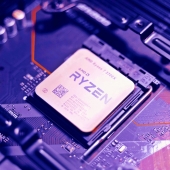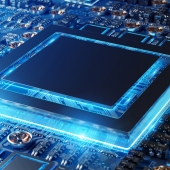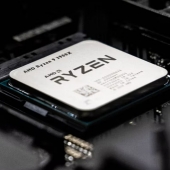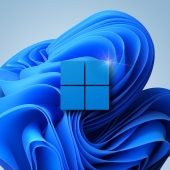-
AMD investigates breach after data for sale on hacking forum
AMD is investigating whether it suffered a cyberattack after a threat actor put allegedly stolen data up for sale on a hacking forum, claiming it contains AMD employee information, financial documents, and confidential information.
- June 18, 2024
- 05:26 PM
 2
2
-
New ZenHammer memory attack impacts AMD Zen CPUs
Academic researchers developed ZenHammer, the first variant of the Rowhammer DRAM attack that works on CPUs based on recent AMD Zen microarchitecture that map physical addresses on DDR4 and DDR5 memory chips.
- March 25, 2024
- 12:00 PM
 0
0
-
Microsoft December 2023 Patch Tuesday fixes 34 flaws, 1 zero-day
Today is Microsoft's December 2023 Patch Tuesday, which includes security updates for a total of 34 flaws and one previously disclosed, unpatched vulnerability in AMD CPUs.
- December 12, 2023
- 02:00 PM
 1
1
-
New SLAM attack steals sensitive data from AMD, future Intel CPUs
Academic researchers developed a new side-channel attack called SLAM that exploits hardware features designed to improve security in upcoming CPUs from Intel, AMD, and Arm to obtain the root password hash from the kernel memory.
- December 06, 2023
- 07:52 PM
 0
0
-
Citrix Hypervisor gets hotfix for new Reptar Intel CPU flaw
Citrix has released hotfixes for two vulnerabilities impacting Citrix Hypervisor, one of them being the "Reptar" high-severity flaw that affects Intel CPUs for desktop and server systems.
- November 15, 2023
- 02:24 PM
 0
0
-
New CacheWarp AMD CPU attack lets hackers gain root in Linux VMs
A new software-based fault injection attack, CacheWarp, can let threat actors hack into AMD SEV-protected virtual machines by targeting memory writes to escalate privileges and gain remote code execution.
- November 14, 2023
- 03:34 PM
 2
2
-
New Inception attack leaks sensitive data from all AMD Zen CPUs
Researchers have discovered a new and powerful transient execution attack called 'Inception' that can leak privileged secrets and data using unprivileged processes on all AMD Zen CPUs, including the latest models.
- August 08, 2023
- 11:00 AM
 5
5
-
New Collide+Power side-channel attack impacts almost all CPUs
A new software-based power side-channel attack called 'Collide+Power' was discovered, impacting almost all CPUs and potentially allowing data to leak. However, the researchers warn that the flaw is low-risk and will likely not be used in attacks on end users.
- August 02, 2023
- 01:37 PM
 1
1
-
Zenbleed attack leaks sensitive data from AMD Zen2 processors
Google's security researcher Tavis Ormandy discovered a new vulnerability impacting AMD Zen2 CPUs that could allow a malicious actor to steal sensitive data, such as passwords and encryption keys, at a rate of 30KB/sec from each CPU core.
- July 24, 2023
- 05:28 PM
 1
1
-
AMD releases Adrenalin 23.7.1 WHQL driver for Windows
After a long break, AMD has launched a new graphics driver, Adrenalin 23.7.1 WHQL (driver version 23.10.01.45).
- July 09, 2023
- 09:25 AM
 0
0
-
New Retbleed speculative execution CPU attack bypasses Retpoline fixes
Security researchers have discovered a new speculative execution attack called Retbleed that affects processors from both Intel and AMD and could be used to extract sensitive information.
- July 14, 2022
- 03:13 AM
 0
0
-
AMD investigates RansomHouse hack claims, theft of 450GB data
Chip manufacturer AMD says they are investigating a cyberattack after threat actors claimed to have stolen 450 GB of data from the company last year.
- June 28, 2022
- 01:18 PM
 2
2
-
New Hertzbleed side-channel attack affects Intel, AMD CPUs
A new side-channel attack known as Hertzbleed allows remote attackers to steal full cryptographic keys by observing variations in CPU frequency enabled by dynamic voltage and frequency scaling (DVFS).
- June 14, 2022
- 03:55 PM
 1
1
-
AMD confirms GPU driver bug overclocks CPUs without permission
AMD is investigating an issue in its GPU software suite that causes an auto-adjustment of AMD Ryzen CPU performance settings for users without permission.
- April 06, 2022
- 09:53 AM
 0
0
-
Intel, AMD, Arm warn of new speculative execution CPU bugs
Security researchers have found new a new way to bypass existing hardware-based defenses for speculative execution in modern computer processors from Intel, AMD, and ARM.
- March 09, 2022
- 12:03 PM
 3
3
-
AMD fixes dozens of Windows 10 graphics driver security bugs
AMD has fixed a long list of security vulnerabilities found in its graphics driver for Windows 10 devices, allowing attackers to execute arbitrary code and elevate privileges on vulnerable systems.
- November 11, 2021
- 01:13 PM
 0
0
-
Windows 11 KB5006746 update fixes gaming performance issues
Microsoft has released the optional KB5006746 cumulative update preview for Windows 11, fixing sixty-four issues, including AMD CPU performance and gaming issues.
- October 21, 2021
- 02:40 PM
 1
1
-
Windows 11 build 22000.282 fixes CPU performance issues, taskbar bug
Microsoft released Windows 11 preview build 22000.282 yesterday with fixes for AMD CPU performance issues and a bug that displayed the Windows 10 taskbar.
- October 16, 2021
- 12:49 PM
 2
2
-
AMD warns of up to 15% Windows 11 performance decrease
AMD says it observed performance hits of up to 15% on Windows 11-compatible AMD processors when using some applications.
- October 07, 2021
- 12:17 PM
 9
9
-
Windows 11 to only support one Intel 7th gen CPU, no AMD Zen 1 CPUs
Microsoft announced today that after investigating other potentially compatible processors for Windows 11, they only found one 7th generation Intel CPU to be compatible, and no first generation AMD Zen CPUs.
- August 27, 2021
- 01:00 PM
 16
16

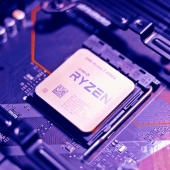
 0
0



